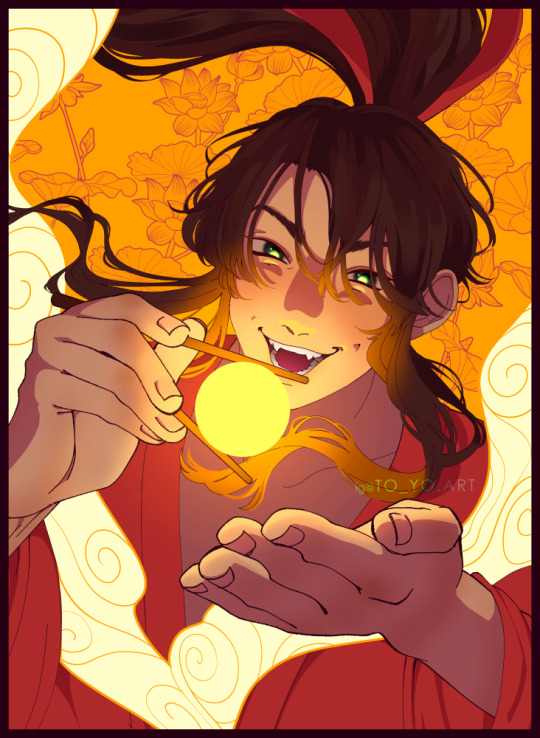#cnovel
Text

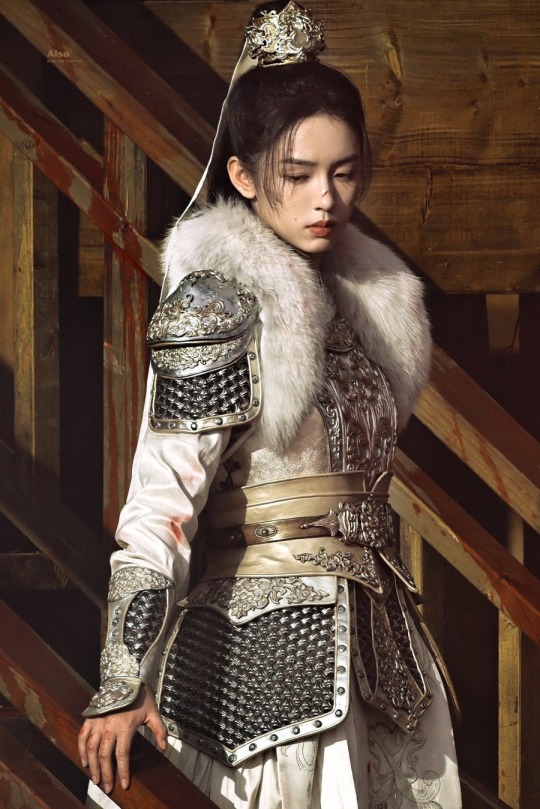
I was today years old when I learned Legend of the Female General is an adaptation of Rebirth of the Star General which I loooove!
45 notes
·
View notes
Text
wuxia, xianxia, and cultivation differences meta
translations: wuxia 武俠, xianxia 仙俠, and cultivation 修真/修仙 (xīuzhēn/xīuxiān)
think i've seen posts on this eons ago, and i'm pretty sure there are tons of these online, but since this has been written up already let's just have another one.
wuxia 武俠
wuxia and xianxia sound similar, but basically for wuxia it is about the pugilistic world (江湖 jiānghú). It is relatively more down-to-earth, and people practice martial arts ("kungfu") in their current life -- they do not do it to become xians (仙) and gods (神) however.
Like Thousand Autumns and Faraway Wanderers/Word of Honor, it has more historical background and ties to the current court and kingdoms, because people are living in the moment and concern themselves with worldly issues.
Martial arts may seem unrealistic, but in view of chinese fantasy it would be considered "real". It consists of fighting moves and internal energy, which they call qi or nèigōng (內功), and at times you see people flying around, climbing hills and jumping across rooftops which is qīnggōng (輕功).
xianxia 仙俠
A level up would be xianxia, where characters in the story cultivate to become xians (and gods, like in the heaven official's blessing). They don't really care about earthly issues here now, because their ambitions lie beyond the current world, and cultivation, getting stronger, and an immortal life are majorly all their goals.
You may not always see them working towards that purpose, such as in mdzs they are considered a lower-xianxia society (低魔), meaning people don't go through all the steps of cultivation and only stay at the stage before the "golden core" stage.
In xianxia, characters still learn basic fighting moves aka. martial arts, but to direct the internal energy they use línglì (灵力), zhēnqì (真气), and fǎlì (法力), all xianxia terms you commonly see. "neigong" is practically nonexistent in this genre. That's why people building up their "neigong" instead of "lingli" are likely never going to be able to cultivate.
cultivation 修真/修仙
A subgenre in the xianxia category would be cultivation. Characters actively go through the stages of cultivation, and likely for the MC, because they are the main character, they successfully become a xian and exit the world at the end of the novel.
There are many stages of cultivation, usually defined at the beginning of the novel in the synopsis, and a typical example of the different levels would be this:
练气,筑基,金丹,元婴,化神,炼虚,合体,大乘,渡劫
And with a cursory search, an English translation would be something like this, albeit not with all the cultivation ranks identified.
Qi condensation (练气), Foundation establishment (筑基), Core Formation (金丹), Nascent Soul (元婴), and the names after that vary too greatly with translation and fandom so I'll jump straight to Immortal Ascension
extra info: getting into the philosophy of it all
It'd be interesting to note that the word "xiá" (俠) permeates all these genres. This is something akin to the concept of "hero", but not at all also, and I'd love to speak more on this but this post has already gone way longer than I hoped it would be, so perhaps another day.
Regardless, it is interesting to note that wuxia has a greater emphasis on "xia" than xianxia. (some joke that cultivation doesn't have the word "xia" in it, and much of that is because characters have foregone heroism and focused on gaining powers and working towards ascension instead). As a result, wuxia is more confucianism-oriented, though not without its taoism and buddhism influences.
xianxia, on the other hand, is mainly derived from "dào" (道), from taoism, which is another lengthy concept if I ever get to it.
And some may have heard of the "farming" genre, 种田 (zhòngtián). This has to do with golden fingers (mary sues) in imperialistic china, earning a wealth of money, and all that. It has nothing to do with cultivation, alike they sound in english.
that's it for now, hmu if you wish to ask/discuss!
(and apologies for the pinyin translations, hope it's understandable still! formally writing pinyin they are supposed to be two separate words not one.)
#danmei#mdzs#word of honor#cdrama#thousand autumns#cnovel#wuxia#xianxia#cultivation novel#chinese language#chinese#fate's meta
3K notes
·
View notes
Text
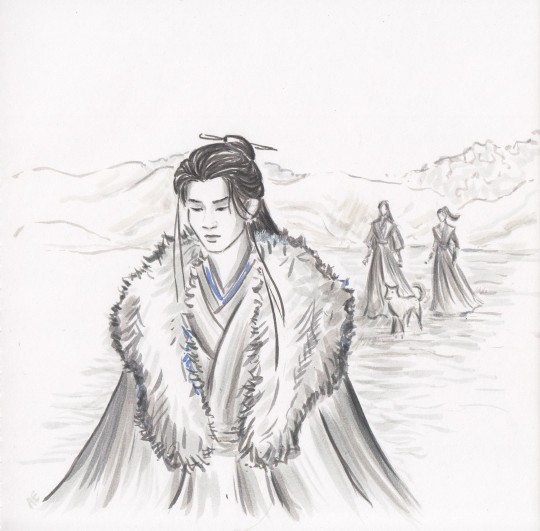
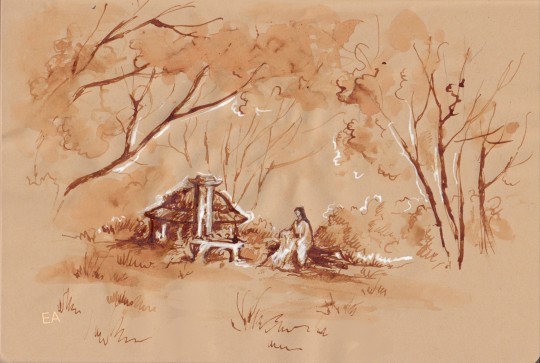
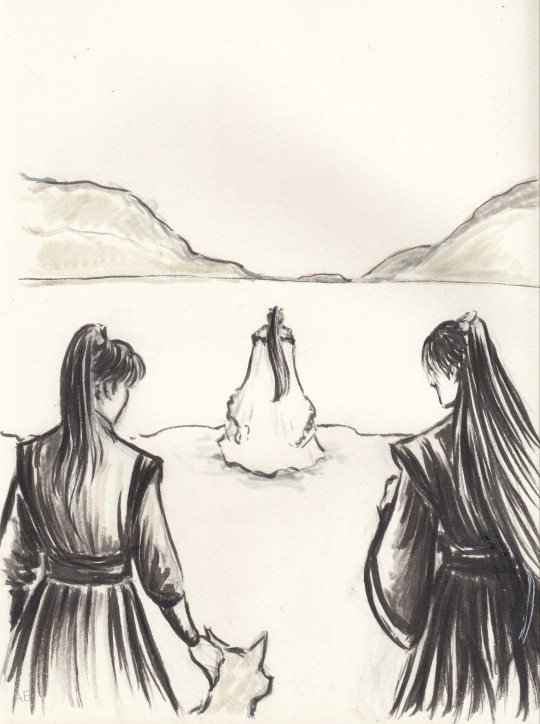
#lian hua lou#li lianhua#fang duobing#di feisheng#fanart#illustrations#cdrama#cdramaart#cnovel#莲花楼#cnovelartreblogs#mysterious lotus casebook
224 notes
·
View notes
Text
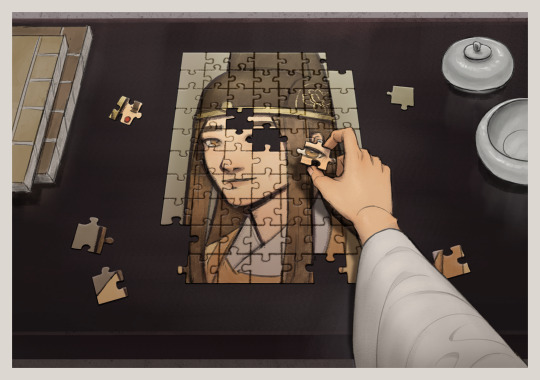
piecing it all together
#jin guangyao#meng yao#mdzs#cql#fanart#just so everyone knows i would not solve a puzzle this way irl#also i looked it up and the generally accepted date for the invention of jigsaw puzzles is the 1760s so this isn’t historically accurate#in case you also wanted to know#whose hand is that?? well :) that would ruin the fun :)#digital#cnovel#art tag#csp
245 notes
·
View notes
Text


tgcf revisions
#mxtx#天官赐福#heaven official's blessing#danmei#hualian#cnovel#tgcf#san lang#xie lian#insane person posts sorry
661 notes
·
View notes
Text

A novel-inspired moment with an escape from Jiao Liqiao's palace
142 notes
·
View notes
Text
SVSSS | The absolute GENIUS meanings behind the name Shen Yuan 沈垣
Ok so most of us already know the meaning of SY 'cause it's in the appendix of the official translation books but I was today years old when I realised just how much meaning MXTX embedded into this name. *spoilers ahead*
Level 1 Meta
Official translation of the word Yuan垣 means wall. But not just any wall, a wall that surrounds something else. It would be specifically used to describe city wall 城垣 or garden fence 花垣 would use this character. This is incredibly fitting for Shen Yuan because his whole story arc is his battle between his logical conscience for survival and his compassionate gut instinct to protect LBH, in other words, to surround and to shield LBH from harm. But this wall of protection functioned against Bingqiu psychologically because SY kept on making decisions without talking to LBH and decided a lot of things on his own. SVSSS is a novel about achieving that balance, to allow both partners to take agency and face life side by side.
Level 2 Meta
Normally, surnames don't have any meaning. Shen沈 is largely used as a name for things/people buttttttt it can also mean liquid or to pour. Guess what, Luo Binghe 洛冰河 means Luo frozen river. So it could be interpreted that Shen Yuan's entire job in the novel is to make LBH achieve his final crybaby form by getting the frozen river Luo to melt, to "pour".
Also, SY made himself melt as well in a way, his internalized homophobia potential toxic masculinity as well as his need to maintain a cool composure were also things he needed to overcome. We finally see him cry for real in the 3rd book, right after LBH scolds him out of anger and worry. Our protagonist learns to break his own walls down and show emotionally vulnerable parts of himself to LBH.
Level 3 Meta
Chinese characters are made up of radicals, meaning more complicated looking characters are made up of simpler characters (radicals) that give clues to their meaning and pronunciation.
Shen沈 is made up of the radicals:
氵 [ shuǐ ] water 💦
冘 [ yín ] can mean to move on OR doubtful of something/someone
The water radical氵💦 occurs in all three characters in Luo Binghe 洛冰河. This can mean that Shen has influence on Luo Binghe's development and overall life. It also reaffirms their compatibility as as couple. I mean let’s be honest, SQQ cries inwardly and LBH cries outwardly, they are both crybabies.
yín冘 perfect describes the base functionality of SY's character; he has a strong survival instinct but is also extremely doubtful of everyone's intentions, especially LBH's.
Yuan垣 is made up of the radicals:
土 [ tǔ ] soil, earth; items made of earth 🌎
亘 [ gèn ] to extend across (dimension/space), through; from 🚀
I find it so fucking funny that MXTX took the tǔ土 soil radical seriously and literally just had SY zombie-himself out of the dirt after 5 years. But it's also really poetic that it once again goes perfectly with LBH's name; the river and earth go hand-in-hand. no wonder LBH asked for Shizun's hand in marriage. 😳😳😳
gèn亘 perfectly describes SY as a transmigrator, someone who travelled across dimension and space. But also SY is really the ultimate sightseer of SVSSS, casually crossing between the human realm and demon realm while also going on road trips with SQH. It's honestly so fucking mint. But I'm here to point out to you how Xin Mo 心魔 LBH's sword (heart demon) is how LBH travels across dimension/space for the majority of the book.
Ultimately, Yuan垣 highlights the importance of finding a home in the people you love. Bingqiu both enjoy that sightseeing lifestyle but the book constantly has important relationship developments, smexy times and domestic Bingqiu set in the Bamboo House. Ultimately, no matter how far you travel, run or chase, you cannot get away from your problems. You need to extend and make effort in understanding and communicating with your SO 🚀 and work on feeling grounded 🌎 in your relationship together.
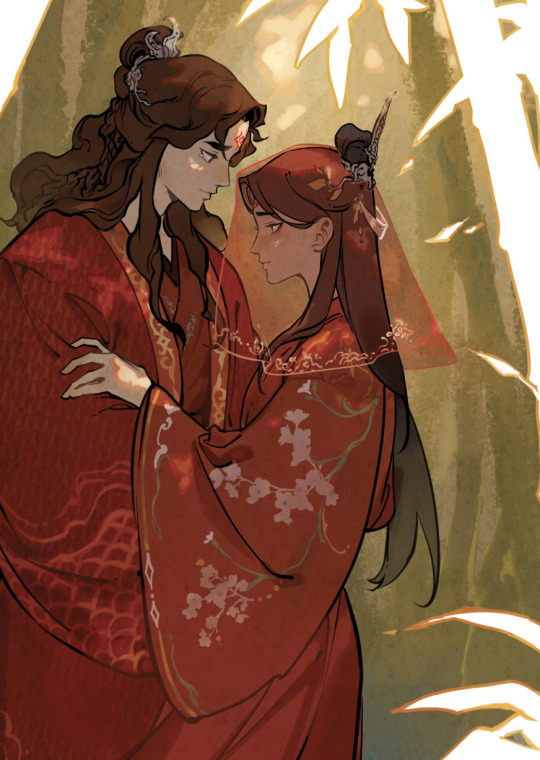
MXTX you freaking genius I-
#svsss spoilers#there is another meta coming out about SQQ's name definitely look forward to it#mxtx is a legend and no one can convince me otherwise#svsss#svsss meta#bingqiu#luo binghe#shen qingqiu#shen yuan#scumbag system#scum villian self saving system#ren zha fanpai zijiu xitong#mxtx#mxtx svsss#svsss analysis#danmei#danmei novel#cnovel
676 notes
·
View notes
Text
What Tai Sui is and Why Everyone Should Read It
So if you follow me, over the past couple weeks, you've probably noticed me obsessively screenshotting and posting about a book called Tai Sui. And now that I've finished it, I'd like to try and convince y'all to give it a chance.
What Is Tai Sui?
Tai Sui is a chinese web novel—a relatively unpopular work by the very popular author Priest (author of Guardian and Sha Po Lang, among others). Unlike a lot of the most popular web novels on tumblr, it's not a danmei. It's in fact rather important to the plot and themes that there is almost entirely no romance, but I promise you, it is absolutely worth it regardless.
What is Tai Sui About?
Tai Sui is a steampunk xianxia cultivation story. For those unfamiliar with xianxia and cultivation, this is a particular genre of Chinese historical fantasy.
The official summary of Tai Sui reads as follows:
“If I had a choice, I would only want to be a little insect in the mundane dust, born in confusion, dying in mediocrity, never seeing the light of day beneath the fog of Jinping City.
Better than taking this wrong road to heaven.”
You may have noticed that this summary is not in fact really a summary. It gives you a glimpse into the story's themes, mood, and destination, but it doesn't exactly tell you what happens in it.
That's because Tai Sui is one of those works that's incredibly hard to summarize. The story is incredibly wide in scope and changes massively over its course, to the point that any summary that encapsulates the whole thing is going to feel like a spoiler. However, I can try my best to add a little detail without giving too much away.
Tai Sui is the story of Xi Ping—an obnoxious, trouble-making rich boy with no interest in cultivation—who gets unwittingly involved in a plot to resurrect the "evil god" Tai Sui. This plot pulls him into the cultivation world against his will and, over time, threatens to rewrite everything he is.
Tai Sui is the end of immortality.
Why Should You Read Tai Sui?
Tai Sui is one of the most compelling stories I have ever read. It is a love letter to the power and promise of the whole world and its many mundane people. It also has some of the best worldbuilding I have ever seen.
Tai Sui is written in omniscient perspective, and though Xi Ping is very much the main character, as the story progresses, we spend more and more time alongside characters that aren't him. By the time the novel ends, his entire continent is at stake, and we the audience know that continent and its troubles inside and out from countless angles. Everyone from the immortal demigods of the cultivation world to the most wretched, miserable paupers is given a grand sense of emphasis.
Tai Sui is a deconstruction of the cultivation genre. It establishes a magic/cultivation system and its history, lets the main character live in that system for a while, and then dives deep into that system's depths. It looks at the cultivation genre, at the idea of people who leave behind their status as mortals for greater things, and asks "How does this really work?" and "Is this how the world should be?"
Tai Sui is the story of countless people who were never supposed to be powerful coming together to make the world a better place. It's well written (and very well translated), exciting, heartbreaking, and incredibly beautiful. It's also funny as hell.
I cannot recommend this story enough.
Warnings/Caveats
As I said before, Tai Sui is a deconstruction of the cultivation genre. If you're unfamiliar with this genre, while the book is certainly readable, you are going to be thrown head first into the deep end with the tropes and terminology at play. It's absolutely worth the learning curve, but it will be kind of a lot. Maybe do some light googling about what a cultivator is before you pick it up. (Or just ask a fan. I think most of us would happily explain anything that would win a new reader).
There are portrayals of people/cultures in Tai Sui that are heavily inspired by minority cultures in real-world China, and some of these portrayals play into pretty harmful stereotypes. It's not SPL "Barbarian" or TGCF Banyue levels of racist, but it's something to be aware of and careful about. I'd really recommend reading from the perspectives of those from the cultures in question (including but not limited to the post I linked) for more about the issues I'm talking about.
Tai Sui's English translation is 930,000 words long. I believe this is a strength, since its length is what allows it such an incredible scope. It is also a fucking daunting commitment, and I acknowledge that.
Finally, while Tai Sui doesn't need too many trigger warnings, it does contain some pretty viscerally upsetting depictions of inequality and mistreatment, as well as a few instances of violence toward children. You can't uplift without first seeing what the people need uplifting from, and hooboy. They need it.
There's also some scenes that are technically rather violent, but the goriness is not presented as gore, if that makes sense. It never feels intensely or overly violent in the way some fantasy novels do.
Links
If all my gushing and propagandizing has convinced you to give it a try, you can find the original Chinese version (where you can buy chapters to support the author) on JJWXC.
The complete English translation is free on the website of E. Danglars, who does a truly incredible job with the translating.
Happy reading :).
#my desperate shot at propagandizing now that my followers have sat through months of on and off obsessive tai sui posting#besties it is genuinely so good#it made me cry. and that is a fcking feat.#tai sui#priest#cnovel#webnovel#long post#I'm not putting a readmore on this bc I want to force y'all to look at it#sorry#book rec#invasion of the frogs
507 notes
·
View notes
Text

wangxian meets gustav klimt's the kiss
clip studio paint and photoshop
2019
snag a print or sticker on my inprnt!
#wangxian#mdzs#mo dao zu shi#wei wuxian#lan wangji#lan zhan#wei ying#artists on tumblr#the kiss#cnovel#mxtx#mdzs fanart#gustav klimt#digital art#digital illustration#grandmaster of demonic cultivation#danmei#lwj#wwx#mdzs wwx#mdzs lwj
317 notes
·
View notes
Text
Lin Qiushi continues to be a hilarious horror protagonist in Kaleidoscope of Death
Just as he was about to ask “Li Dongyuan, why are you knocking on my door?”, he felt something was awfully wrong… Li Dongyuan was obviously using the stall to his right, so why were the knocking sounds coming from his left?
“Yu Linlin.” Li Dongyuan’s voice sounded from the other side, “Are there any words on the walls?”
Lin Qiushi was rather taken aback after he heard that. He soon realized there, indeed, were a few rows of words written on the wall. After reading the words carefully, the hairs on Lin Qiushi’s back immediately stood on end. ...
And the final line of these lyrics was the forbidden sentence that should never be sung: 'My legs are gone, so won’t you give me yours?'
“Do you see them?” Li Dongyuan wondered.
Lin Qiushi stared at those words in silence, then regretfully replied, “Sorry. To be honest, I can’t read.”
Li Dongyuan on the left: “…”
Lin Qiushi: “My family was poor so I wasn’t able to attend school. I actually don’t know that many words. Why don’t you come in and take a look yourself afterwards?”
The other side no longer spoke. Lin Qiushi guessed that the person who wanted him to recite these words out loud was rendered speechless by his ignorance.
54 notes
·
View notes
Text
@mj220991 who, along with @mercipourleslivres and @aysekira is my non-danmei novel guru, has informed me that Wishing You Eternal Happiness by Peng Lai Ke is getting an adaptation.
I am both excited and terrified because except for Dreamer in the Spring Boudoir, it’s my favorite non-danmei novel and so it would be glorious to see it on screen if it’s done right, like Shen Li or Ever Night 1 or Lost You Forever 1, but so often adaptations are disasters (see Dreamer, actually.)
Anyway, I was thinking of who my ideal cast for the OTP would be and here is mine:
Lu Yuxiao as the beautiful Zhen Jiafu, a quiet period woman desperately trying to escape her horrifying fate:

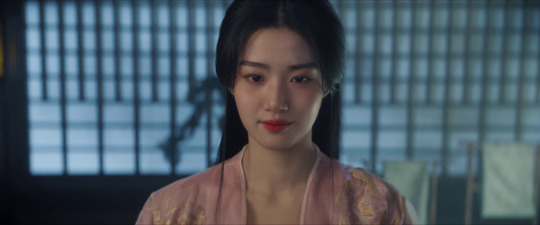

She can do the beauty, elegance, quiet and manipulativeness.
As the depressed, intellectual, kind Pei Youan my choice is Deng Wei:

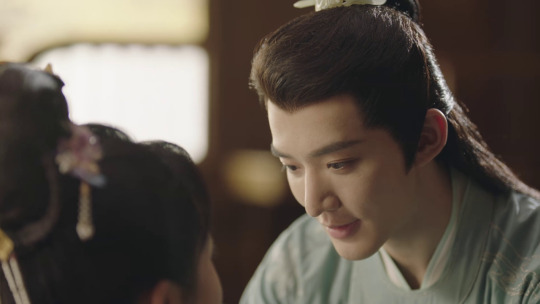
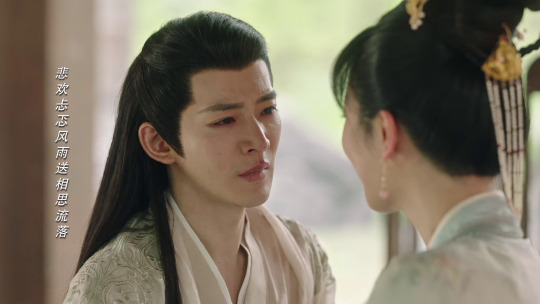
His playing Tushan Jing totally showed him capable of playing a gentle and intense man.
Anyway, this is such a perfect introvert x introvert, kind x kind, quietly desperate x quietly desperate romance and I hope the drama adaptation does it justice.
22 notes
·
View notes
Text
wuxia and confucianism
Hey. Thought I'd answer the wuxia-confucian question very briefly. I did suggest wuxia being closely knitted to confucianism, but I do understand the other perspective of wuxia being anti-confucian. Quick answer only because I've got little time right now -- might add on to it later!!

confucianism
First the central themes of confucianism:
常 (cháng): Virtues of compassion and courtesy. 仁 (rén)、义 (yì)、礼 (lǐ)、智 (zhì)、信 (xìn)、忠 (zhōng)、孝 (xiào)、悌 (tì) (there are more). These in order in crude translation mean compassion, righteousness, courtesy, wisdom, integrity, loyalty, filial piety, and respect to one's older siblings. These are the main ideas Confucius, the founder of Confucianism, wished to spread through his philosophy.
纲 (gāng): Order. This is about the relationships between people, the filial piety of child to their parents, the relationship between significant others, between friends and teachers, and expanding outwards in the sphere of influence in our circle of life, the patriotism and loyalty of a liege to his lord.
Understand that Confucius came up with these ideas in a time of war. He lived his life traversing different kingdoms and establishing his prominence by getting emperors to trust him as a consultant and employ his school of ideas. As such, these beliefs are very much centred around creating harmony and order in society, and of course entails the respect of commoners and lieges to their lords (because why else would kings employ his beliefs over other schools of philosophy if not so?).
wuxia
Moving on to the wuxia genre, the 侠 (xiá) in wuxia emphasises righteousness. xia, as people, are itinerants and rebels in the fictitious pugilistic society who tire of the power of the aristocracy and seek to use their own, often unlawful ways, to help others through 锄强扶弱 (chú qiáng fú ruò) -- helping the needy and going against the strong (the morals are debatable but that's me trying to sum up wuxia in 5 minutes off the top of my head rip).

conclusions
So I guess that's enough information for you to form your own conclusions, and here's what I think, at the very least.
Against Confucianism -- Subverting the power pyramid. Many of the heroes/xia's in wuxia are lawless rebels. They aren't good, upstanding citizens of the society. Hell, xia was first popularised from 游侠列传 (yóu xiá liè zhuàn) in the Han dynasty records, talking about how a "xia" went against the officials and helped the commoners in the name of righteousness. This goes against the confucian beliefs of respecting your lord and serving the kingdom.* That's why I can understand why some would consider wuxia going against confucianism.
Align with Confucianism -- Righteousness. Ultimately, however, wuxia is about righteousness and nobility and honour, defined by society and commoners and not by royal blood. These values of etiquette, decorum, and nobility were long ingrained in the hearts of all these chinese characters, from when the courtesy and etiquette rules were defined in the Zhou dynasty, and afterwards, from the Han dynasty on, when emperors heavily employed Confucian beliefs in education and throughout society because it helps in rebuilding a harmonious society.
Confucianism is about compassion and righteousness, the staples permeating and defining chinese culture in the last two thousand years, and it is these values that serve as the central impetus of the xia and wuxia genres. People are born into these values; as such they fight against the injustice they see, and thus engenders the lost xia's of every dynasty.

*And well, even Confucius wasn't that dead set on fealty to lords. Confucian highly venerated loyalty, but when the court is corrupt, they acknowledge insurgence over the mindless following of an emperor. This is a story for another day, one I would have to back up with more quotes and citations, but I hope this answered your questions, or even better, let you form some conclusions of your own :)
Confucian philosophy is only one aspect that has correlations/influences over the "xia" genre, there are many other interesting things to say about Taoism and Buddhism as well (e.g. Jin Yong's wuxia classics have quite a bit of Buddhist values in the characters owing to author preferences), it's definitely worth looking up on these things if you're interested!
initially reblogged under the original meta post on wuxia, xianxia, and cultivation differences, but i realised it was too long and would bury the reply, so please don't mind me opening a new post for this again.
feel free to ask and discuss!!
#chinese#cdrama#danmei#philosophy#chinese language#chinese culture#wuxia#cnovel#chinese history#confucius#confucianism#chinese philosophy#fate's meta
387 notes
·
View notes
Text

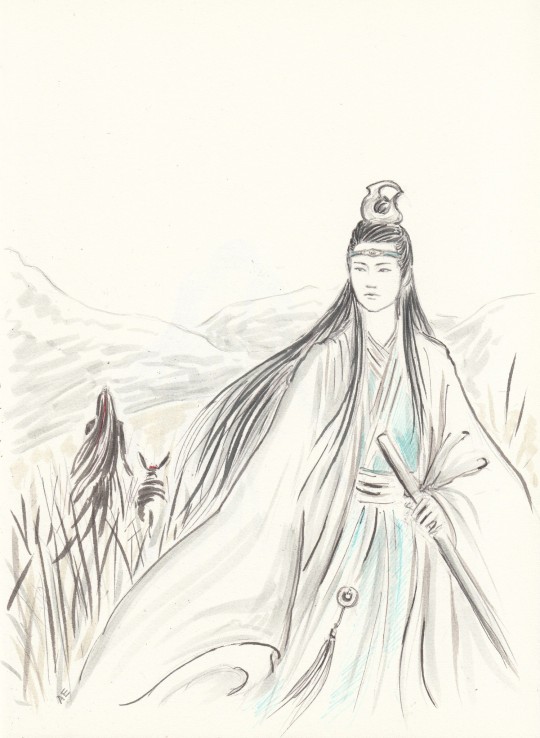
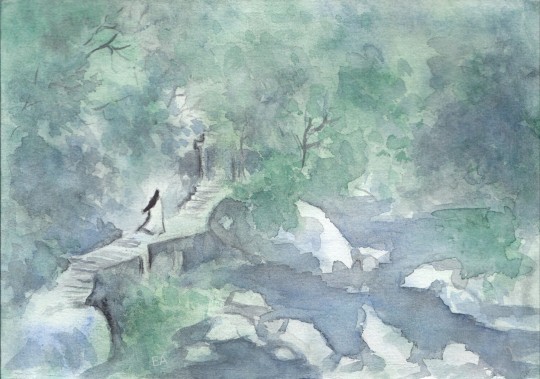

#untamed fanart#theuntameddaily#theuntamed#wei ying#weiwuxian#mo dao zu shi#chen qing ling#lan wangji#lanzhan#meng yao#lan xichen#魔道祖师#fanart#cdrama#cnovel#cdramaart#wei wuxian#illustrations
341 notes
·
View notes
Text

style experiment w yin hanjiang i don’t feel like finishing lol
#feels like i’ve been chipping at this for ages#yin hanjiang#devil venerable also wants to know#dvawtk#fanart#digital#wip#cnovel#art tag#p
166 notes
·
View notes
Text

170 notes
·
View notes
